Iran President Pushes Drone Sales On Trip To Africa

The Iranian president is focusing on securing drone sales in return for food during his latest trip to Africa.

The Iranian president is focusing on securing drone sales in return for food during his latest trip to Africa.
According to Kayhan newspaper, affiliated with Supreme Leader Ali Khamenei's office, President Raisi is working on “extraterritorial cultivation, export of products such as drones and cars, petrochemical products, as well as technical exports".
The latest revelations will come as no shock, the barter deals of the heavily sanctioned regime the only way it can muddle through its current crisis, calling in favors from its dictatorial allies around the world from South America to Africa.
Iran has been providing drones to guerrilla groups across the Middle East for decades, and most recently, has supported Russia's invasion of Ukraine with hundreds of Shahed drones used in large scale missile attacks.
Only in March, Omar Hilal, Morocco’s ambassador to the United Nations, warned: “Iran, after undermining the stability of Syria, Yemen, Iraq and Lebanon, is in the process of destabilizing our region."
Concerns for Iran's involvement in Africa are also high. In October, the US State Department said Iran sent Ethiopia armed drones in the summer of 2021 in violation of a standing UN Security Council resolution.
The United States and its European allies have imposed a series of sanctions on Iranian individuals and companies involved with the drone program and shipments of the weapon to Russia.
Iran first denied it had supplied the drones but in early November foreign minister Hossein Amir-Abdollahian admitted the deliveries, while claiming they were sent before the Russian invasion.

The United States has officially confirmed earlier reports of sending more warplanes and additional warships to the Persian Gulf region to deter Iranian moves.
The Pentagon said Monday that it will send additional F-35 and F-16 fighter jets, along with a warship to the Middle East, in a bid to monitor key waterways in the region following Iran's seizure and harassment of commercial shipping vessels in recent months.
Meanwhile, in a telephone conversation on Monday US President Joe Biden and Israeli Prime Minister Benjamin Netanyahu discussed security challenges Iran poses in the region.
“The two consulted on our close coordination to counter Iran, including through regular and ongoing joint military exercises. They noted that U.S. that the US-Israel partnership remains a cornerstone in preventing Iran from ever acquiring a nuclear weapon," White House strategic coordinator John Kirby said.
In May, the White House had announced that the Biden administration would be making a series of moves in the region, but at the time did not say what it would include.
"The (Pentagon) is increasing our presence and ability to monitor the (Strait of Hormuz) and surrounding waters," Pentagon spokeswoman Sabrina Singh told reporters. It was not clear where exactly the additional jets would be placed and how long they would stay in the region.
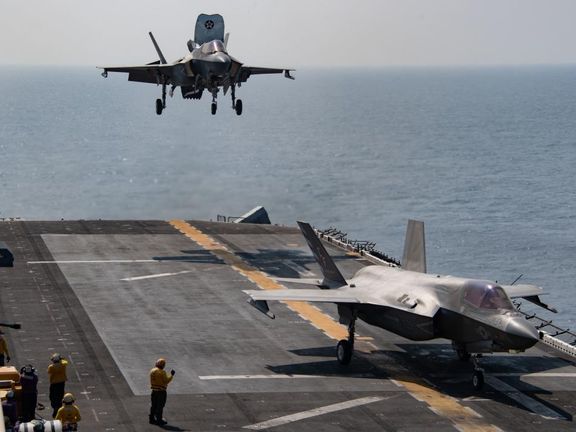
A Pentagon official had said earlier that F-16 fighters will be placed in the region, but Monday’s announcement included more weapons systems.
Iran’s latest attempts to interfere with commercial shipping occurred earlier this month when it tried to seize two vessels. The US Navy announced July 5 that it prevented Iranian naval forces from diverting the vessels including the Richmond Voyager, a super tanker managed by Chevron in the Strait of Hormuz, the narrowest part of the Persian Gulf.
Since 2019, there have been a series of attacks on shipping in strategic Persian Gulf waters at times of tension between the United States and Iran. The Revolutionary Guard has seized or attacked 15 vessels since 2019, according to US NAVY. Over the years, Iranian speedboats also harassed US Navy ships, sometimes in dangerous maneuvers.
About a fifth of the world's crude oil and oil products passes through the Strait of Hormuz, a choke point between Iran and Oman.
With the 2015 Iran nuclear deal effectively dead, Iran's relations with the West have deteriorated over the last year, with Iran supplying hundreds of kamikaze drones to Russia that have been regularly used to attack civilian and infrastructure targets in Ukraine. The US and its allies have warned Tehran to seize its military cooperation with Moscow that can expand into supplying ballistic missile later this year when a UN restriction on Iran expires.
Due to former US President Donald Trump's withdrawal from the 2015 nuclear deal and President Joe Biden not being able to revive it, Iran has been accumulating more enriched uranium and could make the fissile material for one bomb in 12 days or so, according to US estimates, down from a year when the accord was in force.
Iran denies seeking nuclear weapons, which the West sees as a threat to Israel and Persian Gulf Arab oil exporters. But its enrichment of uranium to 60-percent purity has no civilian purpose and can only be for further enrichment to above 90-percent needed for building nuclear weapons.
Iran also probably wants to use escalatory tactics to force Washington to accept its terms in recently reported diplomatic contacts between the two sides aimed at some sort of a deal over Americans held hostage by Tehran.
Iran wants Washington to agree to around $20 billion of its frozen funds in third countries to be released, which would be significant for its beleaguered economy. Iraq holds around $10 billion of debts to Iran, while South Korean banks hold another $7 billion.
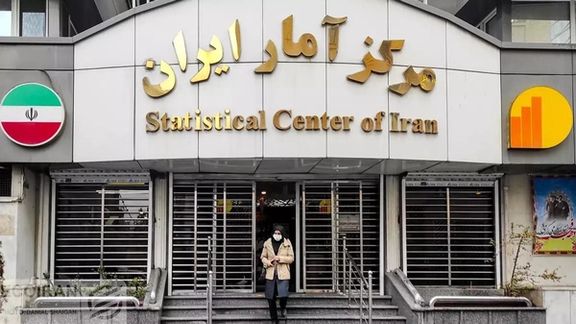
President Ebrahim Raisi has sacked the head of Iran's Statistics Center and the Social Security Organization, as hardliners purge officials outside their circle.
Javad Hossein-Zadeh was removed from his position as the head of the only government institution issuing statistics on the struggling economy, which somewhat differed from frequent rosy claims and predictions by the president and his immediate aides. He was replaced by Daryush Abouhamzeh, who will serve as the interim head for the moment.
Although Iran's Statistics Center is administered and funded by the government and operates under the umbrella of Planning and Budget Organization, it maintained a veneer of credibility as one of the very scarce sources of data – both economic and social.
The central bank and the ministry of the economy stopped issuing regular economic data in 2019 as US sanctions imposed the previous year pushed an already struggling economy into a deep recession.
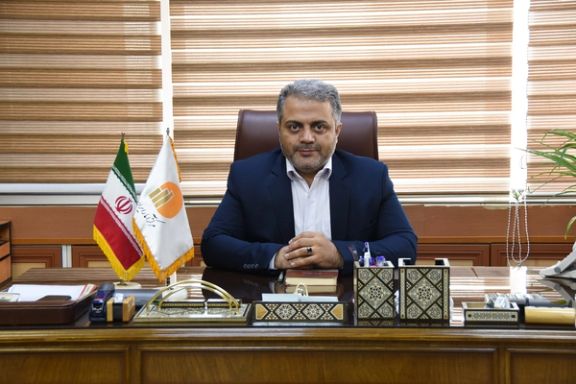
In the absence of credible data by the Central Bank of Iran about the inflation rates, Iran's Statistics Center became the primary official entity announcing these figures. Government officials and sometimes the central bank announced lower inflation figures prices for consumer goods.
Abouhamzeh, who was appointed as the economic deputy of the Planning and Budget Organization two months ago, is apparently a graduate of Tehran and Sharif universities in economics. He previously served as a deputy at the Ministry of Cooperatives, Labour, and Social Welfare in 2021.
In that position he was not always honest with official statistics. Once he famously put the poverty line in Iran so way off that his video went viral at the time. Following reactions, it was announced that Abouhamzeh’s data were at least two years old.
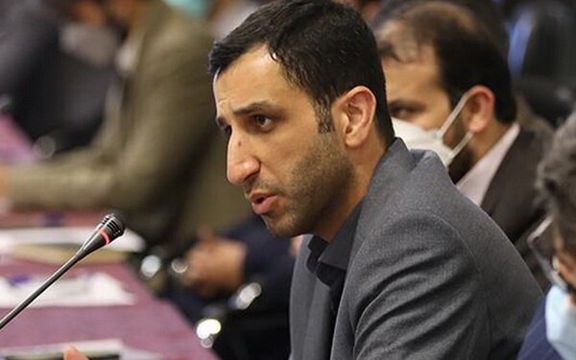
An intriguing development surrounding the Iran Statistics Center is that its official website has remained inaccessible for the past three days without any official explanation.
Also on Monday, reformist daily Etemad said that the head of the Social Security Organization was "dismissed," citing informed sources. Mirhashem Mosavi was reportedly replaced by one of his deputies. The public relations department of the organization has denied the news.
Reports of recent changes in leadership positions of organizations in charge of data about Iran may further raise concerns about the accuracy and transparency of economic indicators in the country.
Last week, lawmaker Gholamreza Nouri Ghezeljeh insisted that the annual inflation rate in Iran is 120 percent, not even 60 or 70 percent as various politicians and academics cite, adding that lower inflation figures close to 40 percent presented by some officials, who claim they have controlled rising prices, is the product of their imagination.
The Iranian government claims to have controlled the inflation rate at about 40 percent. However, as Ghezeljeh noted, "Playing with figures will not solve the problem of Iran's economy. High inflation cannot be concealed from the people as they find out about it when they purchase goods in their everyday life "
The rial’s catastrophic drop tells the story of inflation in Iran. The currency has lost its value 13-fold since 2018. Price inflation is highest in the food sector, which even last year was estimated to have been between 70-100 percent. The country must import a large part of its food, animal feed, medicines, raw materials, and finished goods it needs. As the local currency loses value on the backdrop of international isolation over the regime’s policies, imports become more expensive and higher prices must be passed on to consumers.
Although large-scale anti-regime protests in 2022 and 2023 were driven by social and political oppression, but widespread deprivation also fuels hopelessness among young people.
Ruling hardliners are increasingly pushing members of other camps out of the political arena, and this partly explains purge of officials.
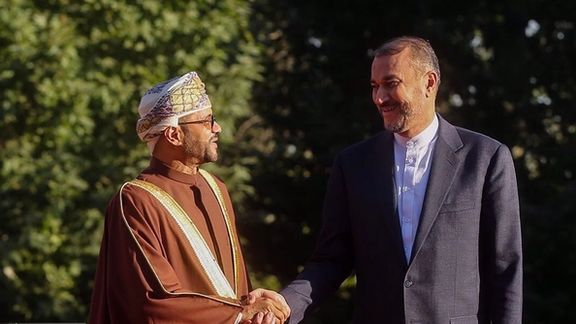
Oman’s Foreign Minister who is in Tehran for talks with the Islamic Republic authorities, met his Iranian counterpart Hossein Amir-Abdolahian on Monday.
Iranian media said the latest mutual, regional and international developments would be top on the agenda during Sayyid Badr Albusaidi’s meeting with Iranian officials.
As part of his weekly press conference on Monday, Iranian Foreign Ministry spokesman Nasser Kanaani described Oman as a friendly country and a partner in regional affairs.
“Oman has always played a constructive role in international issues of common concern,” he added.
Oman has traditionally been an interlocutor between the West and the Islamic Republic, and has mediated the release of several foreign citizens and dual nationals held hostage by Iran.
Last month, Oman's foreign minister told Al-Monitor that Washington and Tehran are ironing out the details on a deal to release the prisoners.
There is a battle raging over the fate of Americans Siamak Namazi, Emad Shargi and Morad Tahbaz, who are imprisoned in Tehran's notorious Evin Prison on trumped-up espionage charges that the United States says are unfounded.
In his interview, Albusaidi noted that both sides appear serious about reaching an agreement on the nuclear issue.
Under a reported mechanism, Iran would be allowed to access funds frozen in South Korean banks because of US sanctions for humanitarian procurements only.
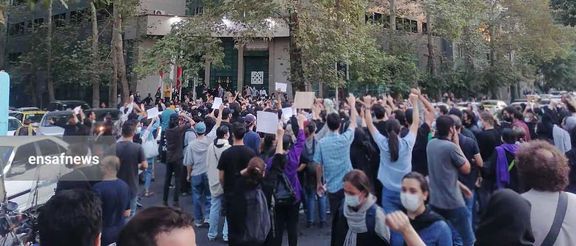
Some Iranian analysts and politicians continue criticizing the ruling establishment, within the limits of controlled media, for the country’s multiple crises.
However last week, prominent economist Mehdi Pazouki told Didban Iran website that government officials have humiliated the nation in the name of their revolutionary approach. Pazouki said, in an unprecedented and daring statement, "One of Khomeini's mistakes was allowing clerics to intervene in the country's social and executive affairs."
He was referring to the founder of the Islamic Republic, Ayatollah Ruhollah Khomeini who after the 1979 revolution gradually expelled independent-minded people from the government and increasingly relied on clerics that he knew had no experience in running a country.
Pazouki added that Iranian clerics can do their biggest service to Islam by migrating back to the seminaries. He further criticized officials for their lack of discipline in foreign relations and administrative affairs and said that as a result of government policies, banking in Iran lags behind other countries by at least 40 years.
Ahmad Alirezabeigi, a member of the Iranian parliament who is known for disclosing a major bribery case involving at least 75 other lawmakers and a former Industry Minister, accused officials of evading their responsibility and adding insult to injury by making statements that blame the people for the government's shortcomings.

He further accused state officials of mismanaging resources and failing to provide the conditions for the minimum means of livelihood. Alirezabeigi added that government policies stifle investments and make the economy more dependent on state enterprises.
While the country is suffering from energy and water shortage, the government creates obstacles for investment in these areas. It wants to do everything by itself but is incapable of completing any project.
This approach will inevitably lead to capital flight from the country, and add to public discontent.
Criticizing the government's economic policies, economist Pazouki highlighted the fact that Iran’s currency has lost its value 12-fold in five years, bringing inflation and misery to the people. He argued that government foreign and domestic policies have stifled an export-oriented economy.
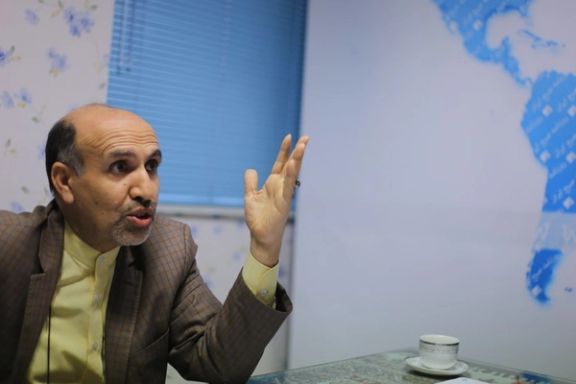
As a result, the government is spending more than its income leading to a huge budget deficit. "The main problem is in our governance. Our economy is hostage to our pending political decisions," he said, adding that although there are so many capable individuals in Iran, most current officials are much less qualified than former statesmen."
As an example, he said: "Just compare the current foreign minister to his predecessor, and you will find out that we have gone back by at least 40 years.
Expounding on the causes of Iran's rising inflation, Pazouki said: "Last year, Iraq sold $120 billion of oil while Iran's oil export was less than a quarter of that, and we still have not repatriated the money for the oil we have sold." He added: "We are likely to have even more problems if we refuse to come to terms with the world and follow a reasonable foreign policy," referring to the nuclear dispute with the West and crippling US sanctions.
In another developing, offering a way out of the problem, political commentator Abbas Abdi suggested that the government should find out about the true public mood and what ordinary people say.
“Send your agents to mingle with the people on the buses, subways, in the bazaar and shopping centers to talk with citizens and record what they say about their problems and needs.”
Abdi likened the perception of officials about the problems of ordinary folks to the elephant in the darkroom analogy in which everyone has a different perception of the elephant. Abdi suggested: "Turn the lights on and see the elephant!"
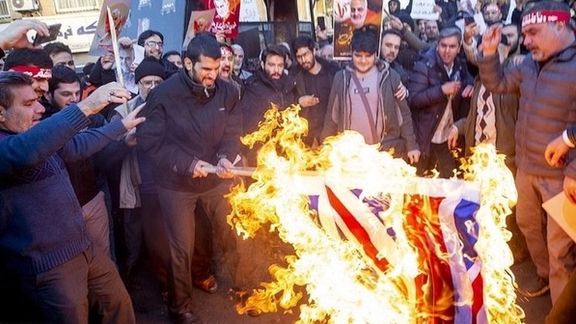
A group of UK politicians have written to Foreign Secretary James Cleverly calling on the government to adopt more stringent measures against Iran.
“Iran is the Middle East’s largest, most aggressive power, with an obvious commitment to revising the global order, with a growing alliance with Russia and a desire to deepen it," read the letter by a group of prominent British figures, including two former defense ministers, a former leader of the Liberal Democrat party, and the current chair of the parliamentary committee on foreign affairs.
The signatories included Menzies Campbell, former leader of the Liberal Democrats, Michael Fallon, former defense secretary, Alicia Kearns, chairwoman of the Commons Foreign Affairs Select Committee, General David Richards, former chief of defense staff, George Robertson, former NATO secretary general, and Mark Sedwill, former national security adviser and former cabinet secretary.
The letter highlighted Iran’s increasing audacity in its pursuit of international disruption and condemns its human rights record, nuclear program acceleration, support for proxies in the Middle East, assistance to Russia in the Ukraine conflict, and sponsorship of terrorism and kidnapping, stating that these actions contribute to Iran’s status as a clear threat to international stability and necessitate a robust response from the UK and its allies.
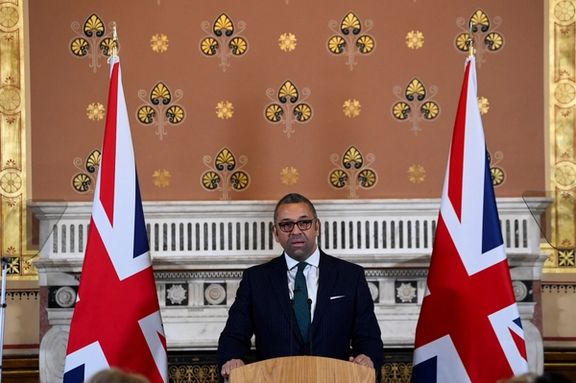
In the letter, they backed the analysis and recommendations of a report from the British conservative think tank Policy Exchange, which argues that treating Iran’s nuclear ambitions in isolation from broader security concerns is a failure of Western policy, urging a comprehensive approach to deal with the regime.
"The most obvious failure of western policy, and particularly British and European policy, has been to compartmentalize the nuclear issue diplomatically and then treat this as the central policy issue in relations with Iran,” read the report.
Stressing the need to view the nuclear program within the context of Iran’s wider aspirations and aggressive behavior, the think tank said, "Nuclear developments, while an important part of the package, must be situated within a more comprehensive understanding of the wider threat posed by Iran. Iran policy, meanwhile, must begin with the strategic threat that Iran poses, not the single, symptomatic element that is its nuclear program.”
The report also claimed that in the 2010s, the Islamic Republic shifted from a defensive strategic posture to an expansionist one, warning that “Iranian expansion across the Middle East will continue unless there is a Western – and indeed a regional Arab – policy change.”
Referring to the regime’s links to proxies in Iraq, Syria, Lebanon, and Yemen, as well as relationships with Palestinian Islamic Jihad (PIJ) and Hamas, the report argued: “The longer Iranian regional expansion is left unchecked, the more Iran will cement its hegemony over significant parts of the Levant, Iraq and the southern Arabian Peninsula, intensify its efforts to undermine and eventually destroy Israel and expand its presence beyond the Middle East.”
Moreover, the report argues that the UK government should be doing more to counter both overt and covert regime’s operations within Britain, to "prevent assassinations and kidnappings in the UK, including by tasking the Joint Terrorism Analysis Center and National Crime Agency’s intelligence capabilities, along with MI5 and MI6 to hire more Persian analysts and better fuse MI5, MI6, and NCA capabilities".
Rooting for tougher sanctions on Iran and a crackdown on its illicit finances as well as disrupting the regime’s relations with Russia, the report called for the UK government to trigger the snapback process of the Joint Comprehensive Plan of Action (JCPOA), also known as the 2015 Iran nuclear deal, to isolate the regime and gain international support for an anti-Iranian coalition.
“Iran will soon expand its support to Russia’s war in Ukraine. Having already transferred drones to Russia, Iran is likely soon to begin transfers of advanced ballistic missiles to the Kremlin,” the report underlined, forewarning of the sanctions on Iran’s ballistic missile exports that will lapse in October under the JCPOA, if the snapback is not applied.
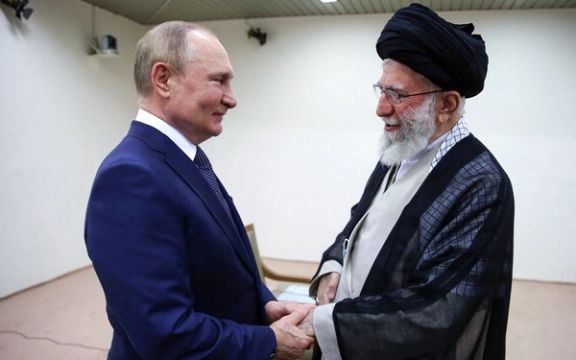
The think tank argued that triggering the snapback mechanism forces the issue of Iran among the signatories of the JCPOA and send a clear message about the international community’s stance on the regime’s nuclear program
Strengthening security and intelligence partnerships with key powers surrounding Iran, including Azerbaijan, Saudi Arabia, the UAE, Jordan, and Israel, was also suggested as a means to enhance the UK’s position in dealing with the Islamic Republic.
According to a report by The Times, UK diplomats are in talks with western allies -- France, Germany and the United States -- about reimposing sanctions on Iran amid warnings that the country is a threat to British interests “at home and abroad”.
This year, British police and the security services said they had foiled 15 plots by Iran to either kidnap or kill British or UK-based individuals it considers “enemies of the regime”.